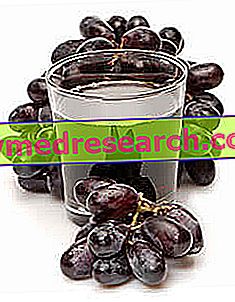What is that
Grape juice is a drink that can be obtained by cooking and pressing (or from the sieve to vegetable pass) the fruit of the vine.
recipe
How to prepare grape juice

The procedure for the preparation of grape juice is simple: put in a casserole 1 kg of grapes already carefully washed, the juice of 1 lemon, any aromatic components and 600-700 ml of water; cook over moderate heat using a lid and stirring frequently with a spoon. Once cooked, it is advisable to use a vegetable pass or a mixer to extract the liquid from the berries, and then squeeze the mixture into a cloth. Finally, adjust the sweetness according to personal tastes and, if necessary, pack as for jams.
Property
More and more often articles written by vegans or vegetarians are spread on the net, which exalt the properties of grape juice to consider it a valid substitute for breast milk; obviously, the comparison is not appropriate.
From a nutritional point of view, grape juice is a very interesting drink and, like wine, it provides good amounts of antioxidants: polyphenols and the "famous" lycopene. It follows that, unlike other sugary non-alcoholic beverages, grape juice has excellent antioxidant characteristics (vaso-protective, anticancer and anti-aging); it has been observed that, in geriatric patients, consumption of grape juice seems to slow down the degenerative processes of memory.
Although the grape juice has good nutritional characteristics and is an excellent substitute for most alcoholic beverages, its composition has nothing to do with that of milk (let alone the maternal one). In nutrition, not only the energy intake and the amounts of macronutrients are evaluated, but their quality and the possible presence of other ESSENTIAL functional molecules.
Differences between grape juice and breast milk
- The biological value of grape proteins is absolutely NOT comparable to that of breast milk, which boasts a higher content of essential amino acids
- Regarding the proteins, in the mother's milk it is possible to observe a certain amount of antibodies and pro-hormonal molecules, while the grape juice is without
- The lipids of grape juice absolutely do not remember those of breast milk; despite being unsaturated and free of cholesterol, those of grape juice do not have MEDIUM chain fatty acids (typical of mother's milk and coconut oil) and essential fatty acids (especially omega 3) in overlapping quantities
- The carbohydrates of grape juice consist mainly of monosaccharide fructose, while in breast milk we find a disaccharide: lactose; currently, the common trend is to EXCLUDE lactose from the diet, perhaps due to the high number of intolerances it generates in the ADULT age. However, what is often not considered is that, both in the newborn and in the adult, lactose SINIFICALLY increases the availability of food calcium contained in it.
- Moreover, among the sugars of breast milk there are also complex molecules to say the least EXCLUSIVE: these are the OLIGOSACCARIDES. These polymers are GENETICALLY determined and their PREBIOTIC function is fundamental to the selection of intestinal bacterial flora in the first weeks of life; obviously, within the grape juice there are not even a few traces of it.
- Vitamins, which undergo a partial inactivation in grape juice caused by heat treatment, are more numerous in breast milk (both in quantity and variety) and perfectly intact
- The trace elements brought by grape juice are not the same as those of mother's milk; grape juice does not provide sufficient calcium and iron BIO available
Ultimately, grape juice is a pleasant drink, rich in antioxidants and highly energetic, but absolutely inappropriate for the replacement of milk and in particular the maternal one.



